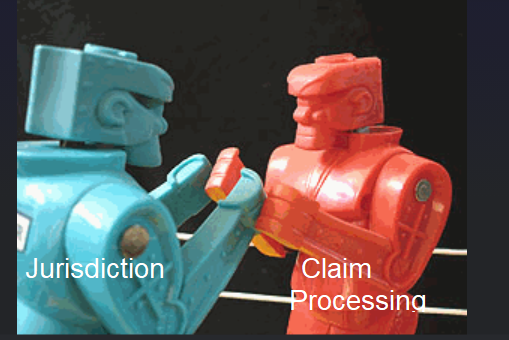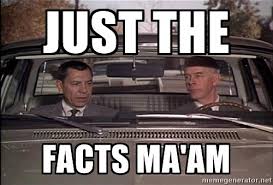 Dickson v. Janvey clarifies the limits of a district court’s power to issue a global bar order. The Fifth Circuit held that the district court overstepped by attempting to enjoin foreign liquidators—who were not subject to its personal jurisdiction—from pursuing claims related to the Stanford Ponzi scheme in Switzerland. As the Court noted, “no in personam jurisdiction, no injunction,” rejecting the idea that a court’s in rem jurisdiction over a receivership estate could justify expansive orders against parties beyond its reach. No. 23-10726 (Aug. 15, 2024).
Dickson v. Janvey clarifies the limits of a district court’s power to issue a global bar order. The Fifth Circuit held that the district court overstepped by attempting to enjoin foreign liquidators—who were not subject to its personal jurisdiction—from pursuing claims related to the Stanford Ponzi scheme in Switzerland. As the Court noted, “no in personam jurisdiction, no injunction,” rejecting the idea that a court’s in rem jurisdiction over a receivership estate could justify expansive orders against parties beyond its reach. No. 23-10726 (Aug. 15, 2024).
Category Archives: Anti-Suit Injunctions
 Dickson v. Janvey, a dispute about the scope of an anti-litigation injunction, offers two basic reminders about the process of separating holding from dicta:
Dickson v. Janvey, a dispute about the scope of an anti-litigation injunction, offers two basic reminders about the process of separating holding from dicta:
- Not discussed, likely not holding. “[W]e have previously held that a district court’s power over a receivership enables it to enjoin third parties or non-parties from pursuing certain claims involving the res of the receivership estate. But our statements in those cases implicated the equitable remedies available to the district court and not its jurisdiction. No one objected to personal jurisdiction in those cases, likely because any such objection would have been frivolous. But even if there were a latent in personam defect in those cases, our silence could never be construed as an implicit holding.” (citations and footnotes omitted).
- Not necessary, likely not holding. “Hall suggested in dicta that federal courts may enter in rem injunctions in aid of a previous in rem judgment. It is unclear to us what the Hall court meant by this dicta. But … the Hall court’s reference to an ‘inrem injunction’ was unnecessary to its decision. Federal jurisdiction in that
case was not in rem. So the court’s in rem discussion was nonbinding dicta.” (citations omitted).
No. 23-10726 (Aug. 9, 2024) (Enthusiasts of dicta-holding distinctions will recall that courts have discretion whether to give effect to obiter dicta–an unnecessary but thoughtful statement–under the circumstances of a particular case.)
 In re Jefferson Parish involved a mandamus petition about the interplay between a putative class action (“Ictech-Bendeck“) with a 500-plaintiff mass action (“Addison“). The Fifth Circuit denied relief, as the opinion’s introduction deftly summarizes:
In re Jefferson Parish involved a mandamus petition about the interplay between a putative class action (“Ictech-Bendeck“) with a 500-plaintiff mass action (“Addison“). The Fifth Circuit denied relief, as the opinion’s introduction deftly summarizes:
… This mandamus proceeding arose because the defendants object to the district court’s scheduling of a small group of Addison plaintiffs for trial before Ictech-Bendeck will finish its class certification process, which the defendants have repeatedly delayed.
Petitioners ask us to stop the Addison trial and to order the district court to rule on class certification in Ictech-Bendeck before allowing any further proceedings in Addison. Petitioners raise the novel theory that under Rule 23 of the Federal Rules of Civil Procedure, the filing of a putative class action bars any possible class members from reaching the merits of their own, separate suits until class certification proceedings conclude in the putative class action. …
… Rule 23 establishes a mechanism for plaintiffs to pursue their claims as a class. It does not cause the filing of a putative class action to universally estop all separate but related actions from proceeding to the merits until the class-certification process concludes in the putative class action, after years of motions practice.
No. 23-30243 (Aug. 24, 2023).
 Ganpat v. Eastern Pacific Shipping PTE presented a clash between international antisuit injunctions, and produced diametrically opposed opinions about those proceedings and the appropriate judicial response to them.
Ganpat v. Eastern Pacific Shipping PTE presented a clash between international antisuit injunctions, and produced diametrically opposed opinions about those proceedings and the appropriate judicial response to them.
Majority and dissent agreed on this much:
- Ganpat, an Indian citizen who served on a ship managed by Eastern Pacific, sued in New Orleans about a nasty case of malaria that he caught while serving.
- Eastern Pacific then sued Ganpat in India, won an anti-suit injunction against the American case, and aggressively enforced that order against Ganpat, ultimately getting him jailed in India.
- These events prompted the New Orleans federal court to issue an anti-suit injunction against Eastern Pacific proceeding further with the Indian case.
But from there, the opinions–both, considerably detailed–went in opposite directions in almost every way. The majority affirmed the injunction, calling the Indian proceedings “bizarre” and saying that Eastern Pacific “evaded service,” while the dissent saw “the district court’s rulings as an attempt to compel domestic jurisdiction over a suit with highly tenuous domestic connections.”
The substantial divide between the opinions aptly frames the first sentence in the dissent’s footnote, referring to the Fifth Circuit having “take[n] a more permissive approach to foreign antisuit injunctions than many of our sister circuits: “This approach is probably wrong and should be reconsidered at an appropriate time.” No. 22-30168 (April 28, 2023) (Judge Ho (writing) and Wilson in the majority, Judge Jones dissenting).
 An important question about statutes bearing on the ability of a federal court to hear a matter is whether they are “jurisdictional,” or only speak to issues of “claim-processing.” See, e.g., Reed Elsevier, Inc. v. Muchnick, 559 U.S. 154 (2010). In Rivero v. Fidelity Investments, “[e]xamining the text and structure of the [Declaratory Judgment Act]’s federal-tax exception” led to the conclusion that it was jurisdictional: “[T]he statute plainly ‘speak[s] to the power of the court.’ … [T]he juxtaposition of the DJA’s reference to federal courts’ jurisdiction and the federal-tax exception indicates that the latter deprives a court of jurisdiction that might otherwise exist in cases ‘with respect to Federal taxes.'” The court also noted holdings in cases about a similarly-worded provision of the Anti-Injunction Act. No. 20-40371 (June 10, 2021) (citations omitted).
An important question about statutes bearing on the ability of a federal court to hear a matter is whether they are “jurisdictional,” or only speak to issues of “claim-processing.” See, e.g., Reed Elsevier, Inc. v. Muchnick, 559 U.S. 154 (2010). In Rivero v. Fidelity Investments, “[e]xamining the text and structure of the [Declaratory Judgment Act]’s federal-tax exception” led to the conclusion that it was jurisdictional: “[T]he statute plainly ‘speak[s] to the power of the court.’ … [T]he juxtaposition of the DJA’s reference to federal courts’ jurisdiction and the federal-tax exception indicates that the latter deprives a court of jurisdiction that might otherwise exist in cases ‘with respect to Federal taxes.'” The court also noted holdings in cases about a similarly-worded provision of the Anti-Injunction Act. No. 20-40371 (June 10, 2021) (citations omitted).
 “[T]he only non-moot challenges to the injunction concern its forward-looking terms, which do not stay any ongoing state-court proceedings. See 28 U.S.C. § 2283
“[T]he only non-moot challenges to the injunction concern its forward-looking terms, which do not stay any ongoing state-court proceedings. See 28 U.S.C. § 2283
(absent specific exceptions, prohibiting federal courts from ‘grant[ing] an injunction to stay proceedings in a State court’); see also Dombrowski v. Pfister, 380 U.S. 479, 485 n.2 (1965) (§ 2283 bars only ‘stays of suits already instituted’ but does not ‘preclude injunctions against the institution of state court proceedings’ (citation omitted)).” Hill v. Hunt, No. 18-11633 (revised March 13, 2020).
 In SEC v. Stanford Int’l Bank, Ltd., the Fifth Circuit reviewed an intricate, court-supervised settlement between the receiver for Stanford International Bank and several D&O carriers, and “conclude[d] the district court lacked authority to approve the Receiver’s settlement to the extent it (a) nullified the coinsureds’ claims to the policy proceeds without an alternative compensation scheme; (b) released claims the Estate did not possess; and (c) barred suits that could not result in judgments against proceeds of the Underwriters’ policies or other receivership assets.”
In SEC v. Stanford Int’l Bank, Ltd., the Fifth Circuit reviewed an intricate, court-supervised settlement between the receiver for Stanford International Bank and several D&O carriers, and “conclude[d] the district court lacked authority to approve the Receiver’s settlement to the extent it (a) nullified the coinsureds’ claims to the policy proceeds without an alternative compensation scheme; (b) released claims the Estate did not possess; and (c) barred suits that could not result in judgments against proceeds of the Underwriters’ policies or other receivership assets.”
The Court observed: “By ignoring the distinction between Appellants’ contractual and extracontractual claims against Underwriters, the district court erred legally and abused its discretion in approving the bar orders. These claims . . . lie directly against the Underwriters and do not involve proceeds from the insurance policies or other receivership assets. . . . [R]eceivership courts have no authority to dismiss claims that are unrelated to the receivership estate. That the district court was ‘looking only to the fairness of the settlement as between the debtor and the settling claimant [and ignoring third-party rights] contravenes a basic notion of fairness.'” No. 17-10663 (June 17, 2019).
 In a topic also addressed on 600Commerce today, the interplay of criminal proceedings and civil litigation can be challenging. The conclusions of In re Grand Jury Subpoena summarized when a stay of civil cases can be required: “It is not necessary that the movant for civil discovery specifically intend to circumvent the rules of criminal discovery: a movant with the ‘purest of motives’ would, in the event the civil case wa allowed to proceed, gain access to materials otherwise unobtainable and, in so doing, potentially harm the related criminal investigation. . . . If not enjoined, further proceedings in state court, including civil discovery, could undermine the federal criminal investigation into [Company]. Furthermore, [Company] will not be unduly burdened if the civil proceedings do not proceed for the duration of the criminal investigation: ownership of the electronic devices can be determined after the investigation is complete, and the devices returned to [Company] if its ownership is established.” No. 16-10181 (Juy 19, 2017).
In a topic also addressed on 600Commerce today, the interplay of criminal proceedings and civil litigation can be challenging. The conclusions of In re Grand Jury Subpoena summarized when a stay of civil cases can be required: “It is not necessary that the movant for civil discovery specifically intend to circumvent the rules of criminal discovery: a movant with the ‘purest of motives’ would, in the event the civil case wa allowed to proceed, gain access to materials otherwise unobtainable and, in so doing, potentially harm the related criminal investigation. . . . If not enjoined, further proceedings in state court, including civil discovery, could undermine the federal criminal investigation into [Company]. Furthermore, [Company] will not be unduly burdened if the civil proceedings do not proceed for the duration of the criminal investigation: ownership of the electronic devices can be determined after the investigation is complete, and the devices returned to [Company] if its ownership is established.” No. 16-10181 (Juy 19, 2017).
 A dispute about the scope a “Chinese drywall” settlement illustrates the operation of complex class settlements. Defendants settled with a broadly-defined group of claimants about defective drywall, but limited to claims involving “Affected Property.” Defendants sought to enjoin a case by a class member who alleged that his condominium – which did not have Chinese drywall – had lost value because of its association with a neighboring property that did have defective Chinese drywall (also called or a “stigma” claim). The district court denied the request and the Fifth Circuit affirmed. Mangiarelli v. Sixty-Fifth and One, LLC, No. 14-31355 (Oct. 2, 2015, unpublished). The Court distinguished between the situation when “individuals [are] ‘class members’ under a settlement agreement, yet [are] barred from recovery under the terms of that agreement” from this situation, where the plaintiff “was never entitled to a benefit under the . . . agreements in exchange for releasing his stigma claims.”
A dispute about the scope a “Chinese drywall” settlement illustrates the operation of complex class settlements. Defendants settled with a broadly-defined group of claimants about defective drywall, but limited to claims involving “Affected Property.” Defendants sought to enjoin a case by a class member who alleged that his condominium – which did not have Chinese drywall – had lost value because of its association with a neighboring property that did have defective Chinese drywall (also called or a “stigma” claim). The district court denied the request and the Fifth Circuit affirmed. Mangiarelli v. Sixty-Fifth and One, LLC, No. 14-31355 (Oct. 2, 2015, unpublished). The Court distinguished between the situation when “individuals [are] ‘class members’ under a settlement agreement, yet [are] barred from recovery under the terms of that agreement” from this situation, where the plaintiff “was never entitled to a benefit under the . . . agreements in exchange for releasing his stigma claims.”
Knoles v. Wells Fargo presented a rare encounter between an eviction and the Rooker-Feldman doctrine. No. 12-40369 (Feb. 19, 2013, unpublished). The borrower lost a forcible entry & detainer (eviction) matter at trial in JP court and on appeal. The borrower then sued for damages, Wells removed, and the borrower unsuccessfully tried to get a TRO about possession from the federal district court. The district court denied relief based on the Rooker-Feldman doctrine about federal review of final state court judgments. The Fifth Circuit found that it had jurisdiction over the interlocutory appeal pursuant to 28 U.S.C. § 1292(a)(1), even though the appeal was nominally from a TRO, because the relief at issue was “more in the nature of a temporary injunction in fact, though not in name.” The court deflected an argument about mootness to hold that the order sought a federal injunction against a final state court judgment in violation of the Anti-Injunction Act.
The unpublished case of Gibbs v. Lufkin Industries reviews the basics of anti-suit injunctions. No. 11-50524 (Sept. 7, 2012). The district court dismissed some of plaintiffs’ claims (including the federal ones), remanded the remaining state claims, and enjoined pursuit of those claims during appeal of the dismissal ruling. The Fifth Circuit reversed, noting that the second court ordinarily determines the preclusive effect of a prior court’s judgment, and that simultaneous in personam proceedings do not by themselves require an anti-suit injunction. Id. at 6. The Court distinguished Brookshire Bros. v. Dayco Products, 2009 WL 8518382 (5th Cir. Jan. 23, 2009) as arising from the erroneous remand of the same proceeding.
In GuideOne Specialty Mutual Ins. Co. v. Missionary Church, a coverage case arising from a car accident by church workers on a lunch break, the Court reversed on the duty to defend, disagreeing with the district court’s decision to consider evidence about the state tort litigation as inconsistent with Texas’s “eight corners” rule. No. 11-10894 (July 17, 2012), op. at 9-12. Under that rule, the pleadings about the driver’s status and activities could potentially trigger coverage, creating a duty to defend. Id. at 13. The Court declined to apply a “very narrow’ exception that could apply if a coverage issue did not “overlap with the merits of or engage the truth” of the facts of the case. Id. at 14 (citing GuideOne Elite v. Fielder Road Baptist Church, 197 S.W.3d 305 (Tex. 2006)). The Court ended by reversing an injunction against state proceedings about the accident, citing general cases about the scope of declaratory judgment actions and noting that the “relitigation exception” to the Anti-Injunction Act did not apply. Id. at 15-16.